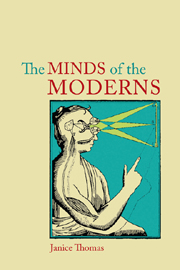Book contents
- Frontmatter
- Contents
- Acknowledgements
- Abbreviations
- Introduction
- I Descartes
- II Spinoza
- 6 Is the mind a substance for Spinoza?
- 7 Spinoza and self-knowledge
- 8 The subject of thought and consciousness
- 9 Spinoza and mental causation
- 10 Spinoza on representation
- III Leibniz
- IV Locke
- V Berkeley
- VI Hume
- Conclusion
- Bibliography
- Index
8 - The subject of thought and consciousness
from II - Spinoza
- Frontmatter
- Contents
- Acknowledgements
- Abbreviations
- Introduction
- I Descartes
- II Spinoza
- 6 Is the mind a substance for Spinoza?
- 7 Spinoza and self-knowledge
- 8 The subject of thought and consciousness
- 9 Spinoza and mental causation
- 10 Spinoza on representation
- III Leibniz
- IV Locke
- V Berkeley
- VI Hume
- Conclusion
- Bibliography
- Index
Summary
What does the thinking?
Part 2 of Spinoza's Ethics is entitled “Of the Nature and Origin of the Mind”, so it may be surprising not to find, among the definitions of “body”, “idea”, “'adequate idea” and so forth with which this part begins, a definition of “mind”. Admittedly the definition of “idea” does say that an idea is a concept of the mind “which the mind forms because it is a thinking thing” (E2d3). Here as elsewhere throughout Part 2, and indeed the rest of the work, Spinoza says and assumes that the mind is a thing that thinks, imagines, conceives and understands. However, it is difficult to form a view on how he thinks the mind does this.
Of course, Spinoza explicitly rejects Descartes's (and Berkeley's) answer: that there is an immaterial substance, the rational soul, that does the thinking in each of us and makes its human possessor fully conscious and self-aware. He also criticizes Descartes for resorting to a supernatural divine agency as the immediate cause of the existence of the rational soul or mind in each human being. Spinoza cannot accept that human minds, any more than human bodies, have a source outside nature or are to be explained in nonnatural terms. And, as we know, he certainly resists any suggestion that finite minds possess the features essential to being substances in their own right.
- Type
- Chapter
- Information
- The Minds of the ModernsRationalism, Empiricism and Philosophy of Mind, pp. 80 - 87Publisher: Acumen PublishingPrint publication year: 2009

